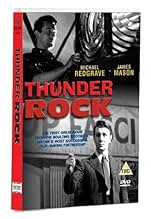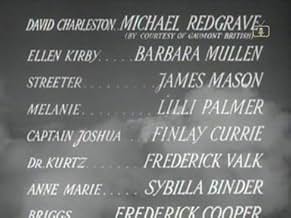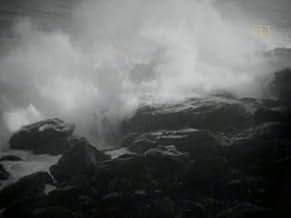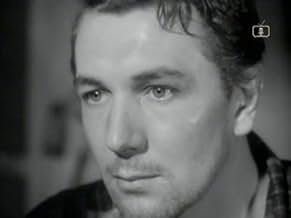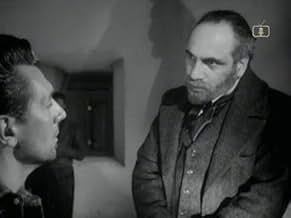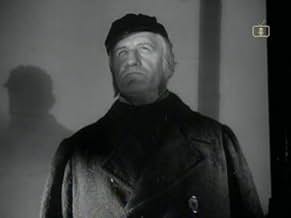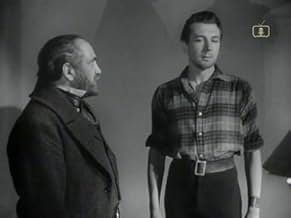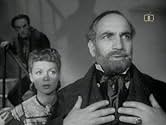IMDb RATING
6.5/10
858
YOUR RATING
Cynical, embittered newspaperman David Charleston (Michael Redgrave) is tormented, then inspired, by visions he keeps having of people who have drowned.Cynical, embittered newspaperman David Charleston (Michael Redgrave) is tormented, then inspired, by visions he keeps having of people who have drowned.Cynical, embittered newspaperman David Charleston (Michael Redgrave) is tormented, then inspired, by visions he keeps having of people who have drowned.
- Awards
- 1 win total
Bryan Herbert
- Flanning
- (as Brian Herbert)
Featured reviews
That this story is an allegory is clear from very early on but the director seems to have wanted to disguise it somehow with unnecessary padding. In doing so he detracts from the overall message and loses his audience a little along the way. Take the opening scenes as an example where a phone call is passed higher and higher through a chain of employees. It's well played, well acted and amusing and of absolutely no relevence whatsoever to the plot. You may as well have had a Donald Duck Cartoon instead and started the film where James Mason lands at the lighthouse.
It achieves some great moments both in and out of it's lighthouse setting, Michael Redgrave is very good but everything just goes on that little bit too long for it's own good.
James Mason stardom puts him near the top of the billing, but he's really only a bit player in this and doesn't make any significant contribution to the overall film.
It achieves some great moments both in and out of it's lighthouse setting, Michael Redgrave is very good but everything just goes on that little bit too long for it's own good.
James Mason stardom puts him near the top of the billing, but he's really only a bit player in this and doesn't make any significant contribution to the overall film.
First of all, THUNDER ROCK is a psychological drama, but the film has very much hidden beneath its surface. This film comes disguised as a rather peculiar fantasy tale, but the truth is that it deals with reincarnation, a fact that's already revealed in the first scenes: A message is passed on by telephone from one office clerk to another, and to another and another. Like knowledge that is transmitted from one life to another.
David (Michael Redgrave) who is living completely on his own in a secluded lighthouse, finds a logbook with an old passenger list. This allows him to tune into his subconscious mind to open up the memories of his past lives. The drowned people, "immigrants from the old world": Each one of them represents a part of David's character. Each one of them could have been a person he once was in a former life. If you believe in reincarnation, this is a film you must see. However, Michael Redgrave is superb and so is the rest of the cast in this beautifully photographed film classic.
David (Michael Redgrave) who is living completely on his own in a secluded lighthouse, finds a logbook with an old passenger list. This allows him to tune into his subconscious mind to open up the memories of his past lives. The drowned people, "immigrants from the old world": Each one of them represents a part of David's character. Each one of them could have been a person he once was in a former life. If you believe in reincarnation, this is a film you must see. However, Michael Redgrave is superb and so is the rest of the cast in this beautifully photographed film classic.
Charleston (Redgrave) lives in self-inflicted isolation as a lighthouse keeper, having become completely disenchanted with the outside world, most of which is complacent in the face of rising evil and looming war. In a dialogue with spirits of the past, he re-evaluates his decision to isolate himself.
Robert Ardrey's 1939 play railed against the widespread complacency at the rise of fascism, and anticipated WWII. That the play flopped in New York on first release and yet did well in wartime London a little later says plenty about how receptive the audience was to the message. In this film adaptation the story is broadened and filled in; it played to packed houses in 1943 America and did well in the UK.
Here the Boulting brothers -perhaps better known for their later comedies- have made an excellent film that is both absorbing and intriguing.
Of course it was made in wartime and the message is played for all it is worth as propaganda. But that doesn't make this film any less interesting or thought provoking. It is a little less overtly metaphysical than some other films from around this time and that is no bad thing; one foot is kept grounded at all times, more or less.
Someone once said "the greatest journeys we go on are those in our own minds" -or words to that effect- and this play/film is testimony to that.
The message that came through most strongly for me was that we owe the past a heavy debt; it is, in the present, always our obligation not to turn away, not to give up or hide away in the face of adversity.
Despite its flaws this film rates a 9/10 from me.
Robert Ardrey's 1939 play railed against the widespread complacency at the rise of fascism, and anticipated WWII. That the play flopped in New York on first release and yet did well in wartime London a little later says plenty about how receptive the audience was to the message. In this film adaptation the story is broadened and filled in; it played to packed houses in 1943 America and did well in the UK.
Here the Boulting brothers -perhaps better known for their later comedies- have made an excellent film that is both absorbing and intriguing.
Of course it was made in wartime and the message is played for all it is worth as propaganda. But that doesn't make this film any less interesting or thought provoking. It is a little less overtly metaphysical than some other films from around this time and that is no bad thing; one foot is kept grounded at all times, more or less.
Someone once said "the greatest journeys we go on are those in our own minds" -or words to that effect- and this play/film is testimony to that.
The message that came through most strongly for me was that we owe the past a heavy debt; it is, in the present, always our obligation not to turn away, not to give up or hide away in the face of adversity.
Despite its flaws this film rates a 9/10 from me.
I saw this movie in 1942, when I worked for the War Department and had just enlisted in the Army Air Corps, so this might account for the strong memories I have of it.
I was a little shocked that it seemed almost pure propaganda. However, it was clearly made for a British audience at a time when the nation was in imminent danger of invasion by the Nazis. Its message was never to give up hope.
It opens with the hero being frightened by the spread of Fascism across Europe. He goes into a London movie house where the depressing newsreel is followed by a cartoon which the unthinking audience finds hilarious. Disgusted, he gives up and withdraws into himself. He becomes a sort of hermit and somehow gets a job as a lighthouse-keeper on the Great Lakes.
Browsing through the lighthouse's log, he finds an account of a shipwreck. As he reads, the viewer notices that the lighthouse's central pole is now at an angle--a very clever hint of the transition to the fantasy now taking place. He is now on board the sinking ship and all is confusion and despair. But it turns out OK--the first example of the message (to the English) not to give up hope.
There are several other such episodes including one about the doctor in Vienna who discovers that doctors not washing their hands is how the deadly childbirth fever infection is spread. A failure, he is laughed out of town. But a few years later his radical theory is proved correct. Another morale boost for the discouraged wartime English.
I can't remember how the movie ends--but I've never forgotten the movie!
I was a little shocked that it seemed almost pure propaganda. However, it was clearly made for a British audience at a time when the nation was in imminent danger of invasion by the Nazis. Its message was never to give up hope.
It opens with the hero being frightened by the spread of Fascism across Europe. He goes into a London movie house where the depressing newsreel is followed by a cartoon which the unthinking audience finds hilarious. Disgusted, he gives up and withdraws into himself. He becomes a sort of hermit and somehow gets a job as a lighthouse-keeper on the Great Lakes.
Browsing through the lighthouse's log, he finds an account of a shipwreck. As he reads, the viewer notices that the lighthouse's central pole is now at an angle--a very clever hint of the transition to the fantasy now taking place. He is now on board the sinking ship and all is confusion and despair. But it turns out OK--the first example of the message (to the English) not to give up hope.
There are several other such episodes including one about the doctor in Vienna who discovers that doctors not washing their hands is how the deadly childbirth fever infection is spread. A failure, he is laughed out of town. But a few years later his radical theory is proved correct. Another morale boost for the discouraged wartime English.
I can't remember how the movie ends--but I've never forgotten the movie!
All the reviewers who wished they could see this film again (some of whom saw it originally in 1942!), can now see it again if they are resident British and subscribe to Freeview tv on Channel 81 It is shown regularly on this wonderful channel which I constantly watch if you can put up with the adverts which finances it, as it saves paying for numerous dvds which I used to do before I discovered this tv station.For example, every Sunday @ 9.p.m. GMT they are repeating the wonderful mid 60s episodes of "The Human Jungle" starring Herbert Lom which I originally saw when it was transmitted (I am now 72).
Some reviewers thought Thunder Rock was too stagey.Does it matter? I saw the classic R.C.Sherriff's "Journey's End" on Youtube the other day which of course is based on his play.What if Michael Redgrave is a bit declamatory at times, he was an accomplished stage actor first.In 1942 Britain was in a precarious position so of course the Government sought propaganda films to help morale & the war effort.See this film on the aforesaid channel, the tv station is bound to repeat it occasionally.
Some reviewers thought Thunder Rock was too stagey.Does it matter? I saw the classic R.C.Sherriff's "Journey's End" on Youtube the other day which of course is based on his play.What if Michael Redgrave is a bit declamatory at times, he was an accomplished stage actor first.In 1942 Britain was in a precarious position so of course the Government sought propaganda films to help morale & the war effort.See this film on the aforesaid channel, the tv station is bound to repeat it occasionally.
Did you know
- TriviaBarbara Mullen (Ellen Kirby) was playing a forty-year-old spinster, yet, she was only twenty-eight.
- GoofsDuring the flashback sequence, when "Briggs" walks back into the room to his family, a crew member's hand can be seen outside the door stopping it from slamming shut.
- ConnectionsReferenced in Le portrait de Jennie (1948)
Details
- Release date
- Country of origin
- Language
- Also known as
- Thunder Rock
- Filming locations
- D&P Studios, Denham, Uxbridge, Buckinghamshire, England, UK(studio: made at D & P Studios Denham - England)
- Production company
- See more company credits at IMDbPro
- Runtime
- 1h 52m(112 min)
- Color
- Aspect ratio
- 1.37 : 1
Contribute to this page
Suggest an edit or add missing content

